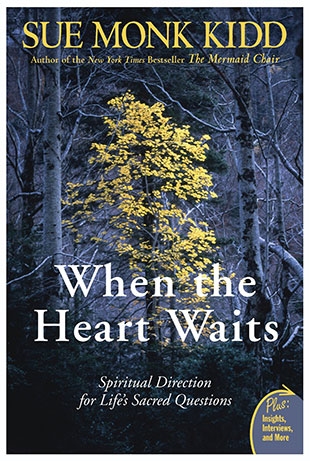On her website Sue Monk Kidd, the author of the bestselling novels The Secret Lives of Bees, The Mermaid Chair, and The Invention of Wings describes her spiritual journey as charted in three memoirs. The first is God's Joyful Surprise, where she delves into her involvement in contemplative Christian spirituality. The third installment is The Dance of the Dissident Daughter where she has a life-shaking encounter with sexism and is set on a new adventure with the Divine Feminine. When the Heart Waits is Kidd's second memoir. It was first published in 1990 before she began writing fiction and was rereleased in 2016.
C. G. Jung divides life into two periods: morning, which is for dealing with the outer world, and afternoon, which is for polishing the full and true inner self. Although Kidd is enchanted by her family, her children, animals, and storms, she senses "a holy summons to a deeper spiritual life." During this transition, she re-evaluates the less-than-inspiring roles of Perfectionist, Performer, Pleaser, and Good Little Girl.
During a visit to St. Meinrad Archabbey, Kidd is troubled by her inability to be patient and to be still. This experience spurs her to ponder the spiritual versatility of waiting. It is not what is is commonly held to be these days:
"Attentiveness is vital to waiting. The word wait comes from a root word meaning 'to watch.' Originally to wait meant to apply attentiveness or watchfulness throughout a period of time and was a highly regarded experience. To wait on God meant to watch keenly for God's coming. Watchers and waiters were nearly synonymous. Unfortunately, much of this meaning has been emptied out of our experience of waiting. These days, the idea of waiting doesn't conjure up the idea of being tuned in as much as it does the idea of being tuned out. We denigrate it to idling."
From the stories in the Bible, however, she gets a different understanding of waiting. Kidd suggests that that the Parable of the Prodigal Son could aptyly be named the Parable of the Waiting Father." Important times for Jesus included waiting: in the wilderness, the Garden of Gethsemane, and the tomb. "Jesus' life," she notes, was a "balanced rhythm of waiting on God and expressing the fruits of waiting." Waiting makes it possible for grace to happen:
"Spirit needs a container to pour itself into. Grace needs an arena in which to incarnate. Waiting can be such a place, if we allow it."
Kidd proves herself to be eager student of new life as she muses on the teachings of the dark night of the soul, the descent into her own body, three ways to respond to crises, the art of letting go, and identifying the symbols of spiritual transformation that have special appeal to her.
